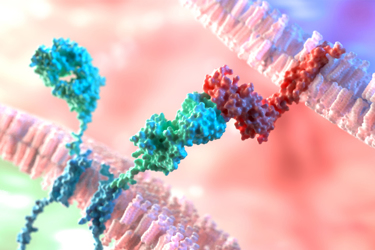Inside Wugen's Off-The-Shelf CAR T Mission

By Matthew Pillar, Editor, Bioprocess Online

Founding CEO John McKearn, Ph.D. is all-in on the pursuit of lower-cost, off-the-shelf, allogeneic CAR T-cell therapies to address a host of oncological indications.
Dr. John McKearn is an academic and research scientist turned biotech entrepreneur and venture capitalist. His latest venture, Wugen, is a private, preclinical biopharma taking a novel approach to developing off-the-shelf CAR-T cell therapies for treatment of T-cell leukemias and lymphomas, Acute Myeloid Leukemia and Multiple Myeloma. He sat down with BioProcess Online to discuss Wugen’s origin story, CAR T-cell manufacturing complexity, and cell therapy competition.
What Begot Wugen?
Wugen marked the first (and so far only) company to launch from the Archer seed stage fund from RiverVest, where Dr. McKearn has served as Managing Director since 2008. “One of our scientific advisors, John DiPersio, M.D., Ph.D., was doing a whiteboard with us about some cool stuff in cancer therapy that might be coming along in the near term,” says Dr. McKearn. “He sketched out an approach to regenerate universal, ‘off the shelf’ chimeric antigen receptor T cells.” While everyone in the room agreed the concept was great, the academic in Dr. McKearn was quick to point out that Dr. DiPersio had no data. “He laughed and said that would change in four or five months. I told him to give me a call when he had it, and that’s literally what happened about four or five months later.”
Dr. McKearn traveled to Dr. DiPersio’s office, where he met Matt L. Cooper, Ph.D., Department of Medicine, Oncology Division, Stem Cell Biology at the Washington University of St. Louis, where the technology had been developed. The trio reviewed the data, and McKearn suggested it was time to set up a company.
It took about six months to negotiate the license with the University. Dr. Cooper’s publication of the technology was released some four months prior to the license deal, which Dr. McKearn admits created some tension. “Drs. Carl June and Jim Allison, the Nobel Laureate in the space, certainly picked up on it,” he says. “They knew about Matt and John's work, so we had to start getting the business path laid our five or six months before we had the license.
Manufacturing Becomes Priority #1

The Shift From Small Molecules To Large Molecules
By the time he launched Wugen, Dr. McKearn had carved out an impressive career in the small molecule space. His resume includes working on the teams that produced some big commercial anti-inflammatory brands, including DayPro, Arthrotec, and Celebrex. He says building a company around CAR T-cells wasn’t all that big a leap. “I was trained as an immunologist and worked on B cell development and B cell signaling, which really blossomed into a field. That training led to understanding the very earliest stages of commitment to the B lineage, and then tracing back to hematopoeic stem cells,” he explains. He collaborated with the renowned Princeton stem cell biologist Ihor R. Lemischka, Ph.D. and noted oncologist Stanley Korsmeyer, M.D. “There was always this interdigitation of big molecule, macromolecule, and protein signaling while learning the tools of small molecule drug discovery and development. Searle again was an ideal laboratory setting for me to learn those tricks,” he says.
Considering The CAR T Competition
Dr. McKearn acknowledges that there’s a lot of attention on the CAR T space right now, and with attention comes competition. That’s why Wugen has been conscious of its attempt to create differentiation from the outset. “We felt it would be important to not go under the same lampposts that most of the other companies were under,” he says. That’s why the company steered away from classic B-cell leukemia lymphoma. “We went after the unmet need in T-cell malignancy,” he explains. “It's a very small patient population in the US, though much larger in Asia.” He says the company has several other licenses that are in late-stage negotiation status right now, though he stops short of elaborating on those, adding only that, “we're building out the pipeline, and it’s very different from what we started with, which was a universal off-the-shelf treatment for T-cell malignancies.” That, he says, is a very difficult category due to T-cell to T-cell killing, whereby the effector population introduced as the drug proceeds to kill off itself, and the T-cells in the host patient. “The clever trick that Matt and John developed remedies that. We’re just about ready to file for an IND in the U.S for our WU CART 007 and start trials here while moving in parallel in China. That’s what got us early entry into the allogeneic cell therapy space.”
Equipping For The Clinic
Dr. McKearn knows the clock is ticking for Wugen. “We're going to be jump-starting with regard to clinical stage assets, and in fact, in some regions of the world could move to registration fairly quickly,” he says. “A cell therapy company has a shelf life or an expiration on its package label of maybe four or five years. If you haven't really achieved what you set out to do in that timeframe, it’s probably ready for the dumpster. The hands on the clock move pretty quickly and that's the pace at which we’re working to really fuel this pipeline in an extraordinary way.”
Learn much more about Dr. McKearn and how Wugen is orchestrating its future on episode 21 of The Business of Biotech podcast.
